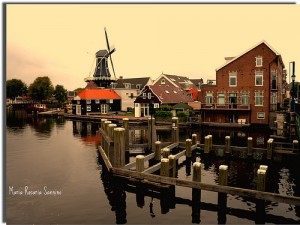The Netherlands and Human Development Posted by Karoly Molina on Jul 29, 2014 in News
A recent study by the United Nations program for Development ranked the Netherlands as number four among the top ten countries with the best index of sociale ontwikkeling or social development. This study measured factors such as the development and progress of people in gezondheidszorg (health care), onderwijs (education), veiligheid (security) and inkomen (income), as well as vulnerability and the capacity for people to recover from such vulnerabilities.
The important points in the description about the Netherlands are the following:
– In the Netherlands, ouderen or the elderly are less likely to be poor. Many ouderen live on their own mostly in apartment complexes or bejaardentehuizen (elderly homes) where nurses can assist them.
– In a comparison between vrouwen and mannen, there is no significant difference in which gender will most likely suffer armoede or poverty.
– In parlement or parliament, 37.8% of seats are held by women. This is, in my opinion is a significant number, but one I hope increases with time.
– In regards to onderwijs, 87.7% of women have reached at least secondary level of education compared to 90.5% by their male counterparts.
– Female participation in the arbeidsmarkt or labor market is 79.9% compared to 87.3% for men. This figure together with the previous one shows that the gender gap is narrowing. The same study reports that female participation in the labor market in the Verenigde Staten is 56.8% while male participation in the same country is 69.3%.
– Since 1980, levensverwachting or life expectancy in the Netherlands has increased from 75.7 years to 81.0.
– For every 100,000 births in the Netherlands, 6 women die from or pregnancy related causes. It is important to point out that the Netherlands is one of the few developed countries that still uses vroedvrouwen or midwives.
– Adolescent birth rates are at 6.2 births per every 1,000 live births in the country.
– Many European countries suffered with the economische crisis or the economic crisis in 2008, however, the unemployment rate in the Netherlands grew very little during this time. This does not mean that the crisis was not felt. To this day, many cities and villages are still attempting to recover after many store and restaurant closures.
– Finally, since 1980, the bruto national product or gross national income has risen 62.2% from $26,145 to $42,387 (amount in dollars).
At the end of the day, these numbers don’t mean much if you do not have the initiatief or initiative to work and become a better person. It is true that the Netherlands is generous in sociale welvaartsprograma or social welfare programs, however, this comes at a high cost for everyone: 36% to 52% belasting or tax on income and 21% on goods. Like any other country, it has many areas of expertise as well as areas where more work needs to be done. The recent surge in politieke vluchtelingen or political refugees throughout Europe will definitely transform these figures. Only time will tell how well each country will fare, but I have high hopes for the Netherlands. The open and tolerant attitude the country is known for will surely help it as times change.
Useful Vocabulary:
de gezontheidszorg – health care
het onderwijs – education
de veiligheid – security
het inkomen – income
de ouderen – elderly
de vrouwen – women
de mannen – men
het parlement – parliament
de arbeidsmarkt – labor market
de Verenigde Staten – United States
de levensverwachting – life expectancy
de vroedvrouwen – midwives
de economische crisis – economic crisis
het bruto nationaal product – gross national income
het initiatief – initiative
de belasting – tax
de politieke vluchtelingen – political refugees

Build vocabulary, practice pronunciation, and more with Transparent Language Online. Available anytime, anywhere, on any device.
About the Author: Karoly Molina
Since I was a little girl, I was fascinated with languages and writing. I speak English, Spanish, Italian, Dutch and a little bit of French. I am a writer, reader, language teacher, traveler, and a food lover! I now live in The Netherlands with my husband Riccardo, our cat Mona, and our dog Lisa, and the experience has been phenomenal. The Dutch culture is an exciting sometimes topsy-turvy world that I am happily exploring!




